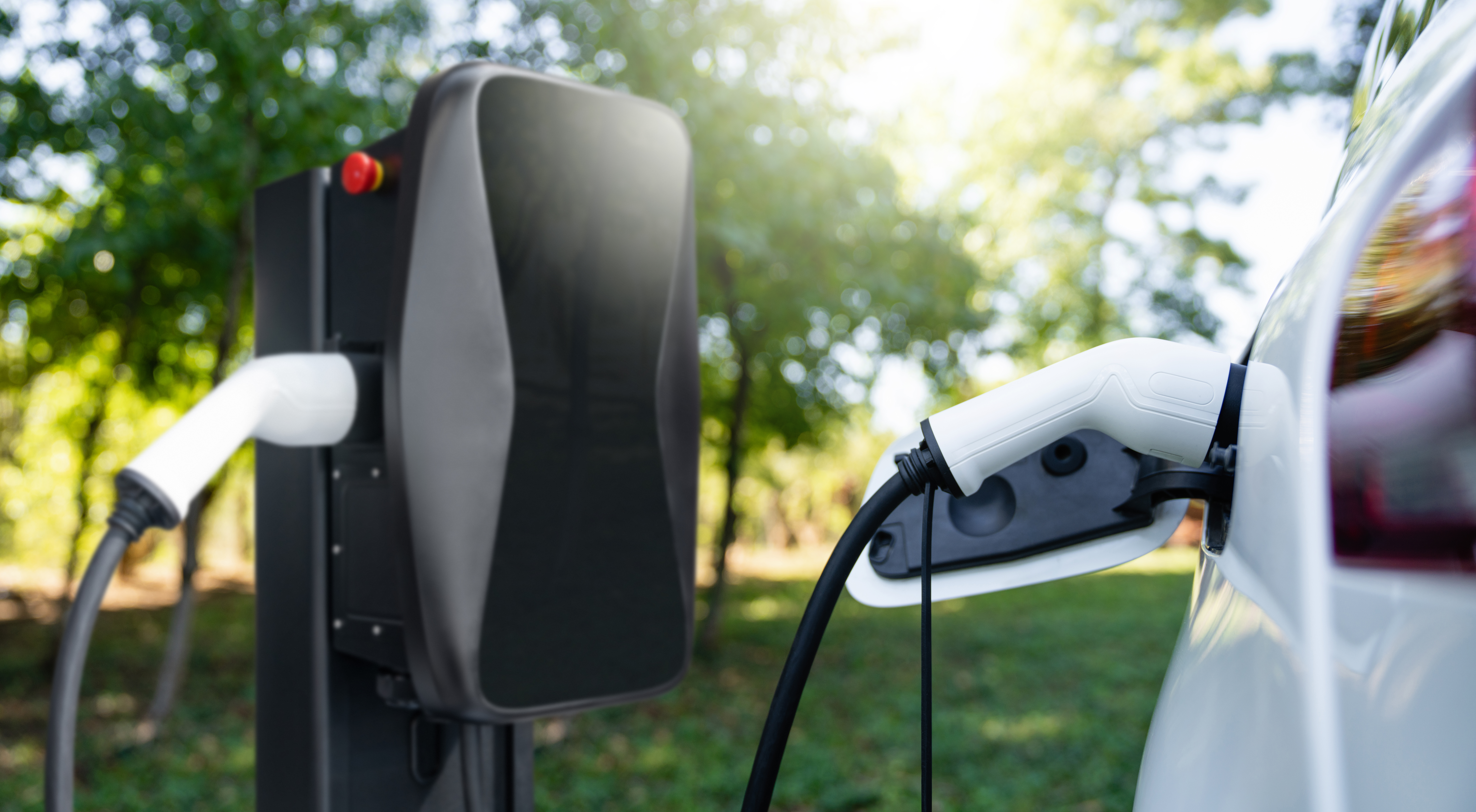The average cost of car insurance for an electric vehicle (EV) is approximately $170/month for basic coverage, and $191/month for full coverage. Drivers with EVs tend to pay 25% more for car insurance than those with gas-powered vehicles—however, you can still find cheaper rates by comparing prices among providers.
The best companies for electric car insurance
Nearly all major insurance companies, such as USAA, State Farm, and GEICO, offer EV coverage. If you want to stay with your current company, odds are they can help you get car insurance for electric cars.
However, switching has benefits, too. You might find a company with a cheaper premium or a green vehicle discount that your current provider doesn’t offer. Here are some of the average rates for electric car insurance with top providers in the nation.
| Insurance company | Average coverage cost |
|---|---|
| State Auto | $137 |
| Travelers | $140 |
| Direct Auto | $159 |
| Nationwide | $166 |
| Safeco | $166 |
| Progressive | $176 |
| National General | $182 |
| Allstate | $204 |
| AAA | $222 |
| Gainsco | $231 |
However, it’s important to remember, these are just average rates. Your premiums may change depending on your specific driver profile.
When shopping for EV car insurance, consider using the Jerry app. Start by creating your profile—then run customized quotes from dozens of providers at once. By tailoring your car insurance to your profile, you’ll be able to find the best rates for you and your vehicle, no matter its type.
Learn more: The best car insurance companies of 2024
Electric car insurance costs are higher than average
The average insurance cost for electric cars is $170 per month, or $2,041 per year for minimum coverage. For full coverage, most EV owners pay approximately $191 per month, or $2,290 per year. These rates average both electric vehicles (EVs) and plug-in hybrid electric vehicles (PHEV).
Compared to auto insurance rates for gas powered vehicles, EV drivers tend to pay approximately 25% more for car insurance. This is partially because most EVs on the road today are new cars or newer luxury vehicles1.
However, it’s important to remember that your rate may differ from the average based on your personal driver profile and your insurance company. Here are the monthly average costs for popular EV models across the US.
| EV model | Minimum coverage cost | Full coverage cost |
|---|---|---|
| Chevrolet Bolt EV | $83 | $239 |
| Nissan Leaf | $99 | $274 |
| Volkswagen ID.4 | $102 | $276 |
| Hyundai IONIQ 5 | $103 | $368 |
| Ford Mustang Mach-E | $112 | $307 |
| Tesla Model Y | $118 | $343 |
| Tesla Model 3 | $117 | $362 |
| Tesla Model X | $128 | $396 |
| Kia EV6 | $140 | $396 |
| Tesla Model S | $144 | $422 |
Why is car insurance for electric cars so expensive?
Based on a recent Jerry study, approximately 49% of drivers were interested in purchasing an electric vehicle in 2023, resulting in a 10% increase from 2022. The reason for the switch was often cited as rising gas prices, however, a majority of respondents also noted concerns over the higher costs associated with EVs.
So, what makes electric vehicles so expensive to own in comparison to their gas-powered counterparts? Jerry did the research, and here’s a video break down of what we found:
In summary, your EV costs may be higher for the following reasons:
- Repair costs are higher for EVs: Although EVs have fewer moving parts than ICE (internal combustion engine) vehicles, EVs are trickier to repair when something goes wrong. A damaged electric car may require specialized components, trained technicians, and more labor hours.
- Accident rates are higher for EVs: According to the Insurance Institute for Highway Safety, accident rates for EVs are slightly higher at 1.21 crashes per million miles versus 1.10 crashes per million miles for gas-powered cars.
- Different models cost more to insure: Depending on which type of electric vehicle you choose, you could be facing higher car insurance costs. For example, Teslas and Rivians are typically 86% more expensive than other electric vehicles.
But it doesn’t mean they need to stay that way. With Jerry, you can offset the expense of owning an EV by shopping for cheaper premiums!
Learn more: Why is my car insurance so high?
Saving money on insuring EVs
Owning an electric vehicle doesn’t have to be expensive. Once you find the right provider, there are also additional ways to lower your insurance costs.
Look into car insurance discounts
Regardless of what type of vehicle you own, car insurance discounts are an excellent way to bring down your car insurance rates. Here are some of the best ones to help you save on premium costs:
- Multi-car discount: If you own more than one car and put both of them on the same policy, you can save up to 12% on your car insurance with Progressive.
- New vehicle discount: Is your car a new vehicle? If so, you may qualify for up to 15% off your GEICO insurance premiums.
- Good driver/accident free: Drivers who remain accident free or keep violations off their record can earn savings with most providers, including Nationwide and Allstate.
Ask about EV rebates and incentives
Many states, including Alabama, California, and Florida, offer rebates and/or incentives for electric vehicle owners. These savings opportunities are put in place to push forward the transition to electric vehicles, while also helping drivers save on EV ownership costs.
Here’s a complete list of EV rates and incentives offered by state, based on information from the Kelley Blue Book2.
| State | Rebate or incentive | What it includes |
|---|---|---|
| Alabama | Rebate | – Discounted time-of-use rate for those who lease or own an EV/plug-in hybrid |
| Arizona | Rebate/Incentive | – Smart Charge Program: $250 rebate for purchasing a Level 2 EV charging station + $85 annual credit – Salt River Project: $250 rebate for purchasing a Level 2 EV charging station + $50 credit for charging at certain times of day – Tucson Electric Power: $500 rebate for purchasing a Level 2 EV charging station – Mojave Electric Cooperative: $1,000 rebate for purchasing a networked Level 2 charging station |
| Arkansas | Rebate/Incentive | – Entergy Electric eTech: $250 rebate for purchasing a Level 2 EV charging station – Southwestern Electric Power Company: $250 rebate for ENERGY STAR-certified Level 2 EV charging station – Carroll Electric Cooperative: $30 credit on power bill + $250 rebate for purchasing a Level 2 EV charging station |
| California | Rebate/Incentive | – California offers several rebates and incentives through different programs, with some savings of up to $4,000+ |
| Colorado | Rebates/Incentives | – Vehicle Exchange Colorado: $6,000 credit toward purchasing an EV or PHEV – Black Hills Energy: $500 rebate for installing a Level 2 EV charging station – Gunnison County Electric Association: $1,250 rebate for those who sign up for time-of-use rates + 25% off the purchase of an EV up to $1,000 – Holy Cross Energy: Gives up to 2 free Level 2 ChargePoint chargers – San Isabel Electric Association: $500 rebate for those who purchase a qualified EV – Xcel Energy: $5,500 rebate for drivers who lease/purchase a new EV + $50 bill credit for charging during off-peak hours |
| Connecticut | Rebate/Incentive | – Up to $7,500 in rebates depending on whether you own a new/used EV, PHEV, or FCEV – Eversource: $500 rebate for purchasing a Level 2 EV charging station + $200 for sign up – Norwich Public Utilities: $5,000 incentive to install a qualified EV charging station – United Illuminating: $1,000 rebate for installing a Level 2 EV charging station + $100 for establishing a charging schedule |
| Delaware | Rebate | – $1,000-$2,500 for purchasing/leasing a new EV – $100 bill credit rebate + $5 monthly bill credit for those who don’t charge their EV during peak hours |
| District of Columbia | Incentives | – Tax credit for 50% of costs associated with installing a residential charging station |
| Florida | Rebate | – Duke Energy: Monthly $10 bill credit for customers who charge their EV with a Level 2 charging station – Jacksonville Electric Authority: Up to $300 for upgrading your home’s electrical system to support an EV charging station – Kissimmee Utility Authority: $100 for EV drivers + $100 for installing a Level 2 charging station – Orlando Utilities Commission: $200 for customers who purchase/lease a new EV + $50 for anyone test driving an EV |
| Georgia | Incentive | – $250 incentive to install an ENERGY STAR-certified Level 2 charging station |
| Idaho | Incentive | – All EVs and plug-in hybrids are exempt from state-required maintenance programs and inspections |
| Illinois | Rebate | – $4,000 for vehicles purchased between July 2022 and June 2026 – $2,000 for vehicles purchased between July 2026 and June 2027 – $1,000 for vehicles purchased after July 2028 |
| Indiana | Rebate/Incentive | – Indiana Michigan Power: $500 for signing up, as long as you have a new or existing Level 2 charger – Applied Energy Services: $250 + $50 per year for participation – Duke Energy: Up to $200 in annual incentives for customers who charge during off-peak times |
| Iowa | Rebate | – Residents must purchase/install a qualifying Level 2 charging station; amount not disclosed |
| Kansas | Rebate | – Up to $2,400 per qualified vehicle – $250 rebate for purchasing a Level 2 EV charger + $250 for signing up |
| Kentucky | N/A | N/A |
| Louisiana | Rebate | – $250 for installing Level 2 EV chargers or ENERGY STAR-certified chargers |
| Maine | Rebate | – Up to $7,500 for purchasing/leasing a new EV – Up to $3,500 for plug-in hybrids* *Amounts vary depending on income |
| Maryland | Rebate/Incentive | – $3,000 tax credit for customers who purchase/lease EVs under $50,000 – Maryland Energy Administration: $700 for installing a qualified EV charging station – Potomac Edison: Save up to 2 cents per kW hour + $300 for installing a Level 2 home charger – Baltimore Gas and Electric Company: $50 annual credit for installing a Level 2 charger – Pepco: $50 gift card for buying/installing a qualifying Level 2 EV charging station |
| Massachusetts | Rebate | – Massachusetts Department of Energy Resources: $5,000 rebate for those who purchase/lease EVs – Eversource: Monthly $10 discount for residents who charge during off-peak hours – Braintree Electric Light Department: $250 discount for purchasing a qualified Level 2 EV charging station – Home Energy Loss Prevention Services: Free and discounted Level 2 EV charging station – National Grid: Up to $1,400 for installing a Level 2 EV charging station + $50 and $20 annual bill credit for pausing charging during peak hours – Shrewsbury Electric and Cable Operations: $1,000 for purchasing a new or used EV |
| Michigan | Rebate | – Michigan residents can earn up to $1,000 for purchasing a networked Level 2 EV charging station and up to $1,500 for purchasing/leasing a new EV |
| Minnesota | Rebate/Incentive | – Drivers in Minnesota can get a one-time E-ZPass account credit with a $250 incentive for EVs purchased between November 2019 and October 2025 – Several other incentive programs off up to $500 for installing a Level 2 EV charging station and discounts of up to $250 on tolls |
| Mississippi | Rebate | – Up to $1,250 for new/leased EVs – $250 for installing Level 2 EV charger |
| Missouri | Rebate | – Evergy: $500 to purchase/install a Level 2 EV charging station – Kirkwood Electric: $300 for installing a Level 2 EV charging station |
| Montana | N/A | N/A |
| Nebraska | Rebate | – Up to $500 for installing a qualifying Level 2 charging station – Additional $500 to cover pre-wiring costs for installing a new EV charging station – Additional $500 for wiring upgrades |
| Nevada | Rebate | – $500 for installing a Level 2 charger (reduced to $250 for not installing) |
| New Hampshire | Rebate/Incentive | – Up to $1,000 for purchasing/leasing a new EV – $300 charger incentive for up to two installations per household – $300 rebate for off-peak charging |
| New Jersey | Rebate/Incentive | – Sales + tax exemption for new/leased zero-emission vehicles – Charge Up New Jersey Program: Up to $4,000 for purchasing/leasing new EVs and plug-in hybrids – PSE&G: Bill credit of up to $1,500 for installing a Level 2 EV charger – Atlantic City Electric: Up to $1,000 for installing a Level 2 EV charging station |
| New Mexico | Rebate | – Powering New Mexico: $500 credit for installing Level 2 EV charging station – El Paso Electric: $500 rebate for installing Level 2 ENERGY STAR-certified EV charging station ($2,300 for low-income customers) – Xcel Energy: $2,500 rebate for low-income customers + $500 for dedicated electrical circuits for Level 2 charging stations + $50 annual credit to charge during off-peak times |
| New York | Rebate | – Up to $2,000 for purchasing/leasing new EV – Central Hudson Gas & Electric: Discounts for charging during particular times of day – ConEdison: $25 3-month bonus for each EV or charging station – Orange & Rockland Utilities: Discount on electricity rates for off-peak charging – National Grid: Time-of-use rate for those who lease/own an EV |
| North Carolina | Rebate | – Up to $500 for drivers wh purchase a qualified Level 2 EV charging station with different programs |
| North Dakota | N/A | N/A |
| Ohio | Rebate | – Up to $250 to purchase/install a Level 2 EV charging station |
| Oklahoma | Rebate | – Oklahoma Electric Cooperative: $300 for owning an EV and having a Level 2 EV charging station to charge on off-peak hours – Public Service Company of Oklahoma: $250 for installing an ENERGY STAR-certified Level 2 charging station |
| Oregon | Rebate/Incentive | – Up to $1,000 in rebates and $5,000 in incentives for upgrading electrical panels and purchasing a Level 2 EV charging station – Low-income families may qualify for up to $7,500 with the Clean Vehicle Rebate Program |
| Pennsylvania | Rebate | – Pennsylvania Department of Environmental Protection: $2,000 on new/pre-owned EVs – PECO: $50 for purchasing a qualifying EV – Duquesne Light Company: $50 bill credit to purchase/lease an EV |
| Rhode Island | Rebate | – Up to $1,500 to buy/lease an EV or plug-in hybrid |
| South Carolina | Rebate | – Up to $250 to purchase qualified Level 2 EV charging station |
| South Dakota | Rebate | – Up to $500 for customers installing an EV charger from approved vendors |
| Texas | Rebate | – Texas residents can earn up to $1,200 in rebates with specific programs to install a new Level 2 EV charging station – Up to $2,500 for buying an EV |
| Utah | Rebate | Up to 75% of charger costs are covered when purchasing a Level 2 EV charger |
| Vermont | Incentive | – Covers up to 25% of upfront costs for low-income families buying an EV, up to $5,000 – Up to $4,000 for state residents who buy/lease a new EV – Virginia residents may also qualify for several other rebate programs, including the Burlington Electric Department and Green Mountain Power |
| Virginia | Rebate | – Dominon Energy: $40 annual payment for enrollment + installed and maintained Level 2 EV charging station for fixed monthly rate – Appalachian Power Company: Time-of-use rate for those who own an EV – Rappahannock Electric Cooperative: $7 monthly bill credit for enrolling in pilot program – Danville Utilities: $200 for purchasing/installing a Level 2 EV charging station |
| West Virginia | Rebate | – Up to $500 for purchasing/installing a Level 2 EV charging station |
| Wisconsin | Rebate | – Wisconsin residents can earn up to $800 with specific programs for installing a Level 2 charging station; some may even provide free installation |
| Wyoming | Rebate | – Up to $500 to purchase an install a Level 2 charging station |
Continuously shop for coverage
Even after you’ve found your ideal provider, it’s always important to keep shopping for better rates. Once renewal comes around, revisit the Jerry app, and see if any new savings opportunities appear. Who knows? You may find a cheaper rate with another provider, or even your same insurer!
Learn more: How to shop for car insurance like a pro
Tips for insuring an electric vehicle
All EV drivers are subject to their state minimum requirements which usually means basic liability insurance coverage, including bodily injury liability and property damage liability. Uninsured motorist coverage may be mandatory, too—it depends on where you live.
Some EV drivers may be required to carry full coverage (collision and comprehensive with an out-of-pocket deductible) if they’re financing or leasing an EV, at least until the loan is paid off. Here are some policy considerations and additional coverages that electric car owners should consider when buying insurance.
- Coverage for EV parts: Batteries and regenerative braking systems are expensive, critical parts in electric vehicles. Make sure your policy covers damage or degradation, or ask about purchasing a special endorsement.
- Repairs with EV technicians: After an accident, your vehicle may require specialized care from a trained technician. See if the company will cover repairs at a certified EV repair shop and if they’ll cover the cost of transporting your vehicle to that repair facility.
- Higher liability limits: Your EV could cause more damage in an accident than a standard vehicle because EVs tend to be heavier than gas-powered cars. More damage means you might face higher claims, but increased liability rates (like 100/300/100) can help.
- Charging station coverage: Whether you plan to use public or private charging stations, ask what kind of policy could protect against damage and liability. What if your wall charger is damaged? What if your vehicle damages the charging station? Speak with a home insurance provider if you have a home charging station about additional protection for events like vandalism, electrical surges, or fires.
- Roadside assistance: EV owners have different needs, so standard roadside assistance programs may not work for you. To alleviate range anxiety, look for an EV-specific program that offers services like mobile charging, charging cable delivery, EV technician consultations, and real-time charging station location information.
It’s also worth checking into programs offered by the car’s manufacturer or your dealership. You could unlock special membership discounts, incentives, or programs tailored to your electric car.
Finally, warranties are very valuable—but insurance companies don’t sell you those, the manufacturer does. Battery, powertrain, and charging system warranties are well worth your consideration as an EV driver.
FAQ
-
Is an electric car more expensive to insure?
-
What is the best car insurance for electric cars?
-
What is the process for getting electric car insurance?
-
What are the benefits of an electric car?
-
What is the difference between electric cars and gas-powered cars?
-
Does insurance cover EV battery replacement?
-
Can insurance go down when you buy an electric car?
-
Does GEICO cover electric cars?
Sources
- https://www.experian.com/content/dam/noindex/na/us/automotive/auto-consumer-trends/q2-2023-experian-auto-consumer-trends.pdf ↩︎
- https://www.kbb.com/car-advice/electric-vehicle-rebates-by-state/ ↩︎

Bonnie Stinson is an insurance writer with 8+ years of experience as a content writer. They specialize in making complex topics like insurance and technology easy to understand. Bonnie has written over 1,300 articles to help people become confident car owners, from how to choose the right car and build a car insurance policy to dealing with stressful situations like car accidents and unexpected repairs. Before joining Jerry’s editorial team, Bonnie worked as a digital media strategist and user experience researcher, producing content for Furnishr, STACKEDD Magazine, InfinityCore Health, and the global non-profit Giraffe Heroes.

Kianna Walpole is an insurance writer and editor with a comprehensive background in consumer behavior and online publishing. With experience in car insurance, maintenance, and repair, she is dedicated to building informative content that helps customers reduce costs while achieving the best service. Prior to joining the Jerry editorial team, Kianna worked as a junior editor in the content marketing industry, using consumer data and key insights to create and edit content for an array of large-scale clients in the real estate, cybersecurity, and healthcare industries.






